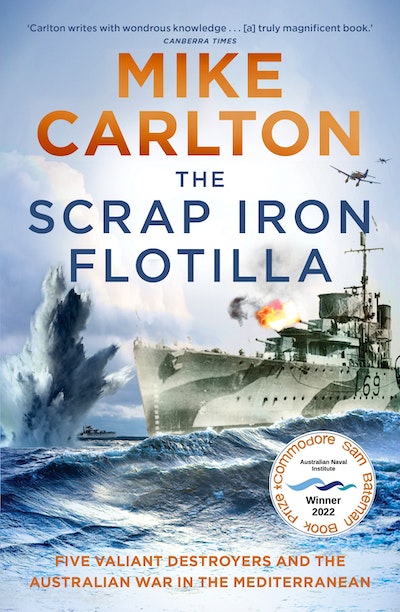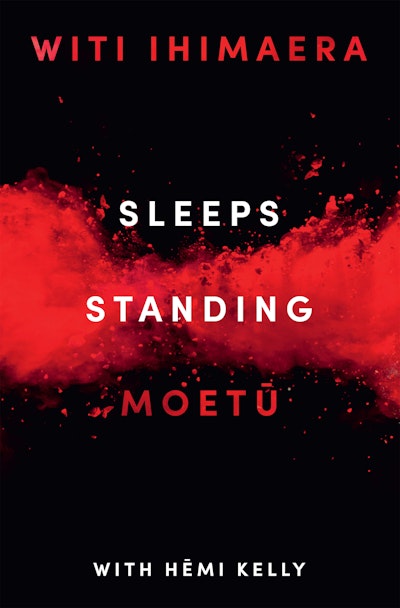- Published: 15 August 2023
- ISBN: 9781761042010
- Imprint: Penguin
- Format: Paperback
- Pages: 448
- RRP: $26.99
The Scrap Iron Flotilla
Five Valiant Destroyers and the Australian War in the Mediterranean
Extract
It was 2100 hours, with night drawn in. The shocked, awestruck silence that followed Espero’s sinking was broken first by several loud underwater explosions, probably her boilers blowing up or perhaps her depth charges. Then came the cries of the survivors in the water, some loud and near, some faint and distant.
John Collins faced a hard dilemma. These were men like themselves, sailors like themselves, whose lives he knew he could save and wanted to save. And he knew instinctively that his crew wanted them saved too. Yet the scarlet funeral pyre of the burning Espero would have been visible for miles, well beyond the horizon, a magnet for any prowling enemy submarine. Should he risk the safety of his own ship and his own men – his first charge and responsibility – to linger on the scene and rescue the enemy? It was a choice between duty and humanity and the decision was his alone to make, a moral question, a captain’s call that Joseph Conrad would have recognised. He pondered it on his bridge that fateful night while the routine of the watch went quietly on around him, the lookouts scanning their arcs of the horizon, a small knot of officers standing at a discreet distance, the midshipman awaiting an instruction, the Chief Yeoman and the Coxswain awaiting an order. To his resounding credit, Collins chose humanity.
‘Stop all engines!’
The telegraphs jangled and the cruiser glided to a halt. The pipe echoed through the ship. ‘Away seaboats!’
Sydney’s crew had been anticipating the order, awaiting the moment. The two cutters were in the water in an instant and pulling towards the distant shouts. The description by Jack Ross is matchless:
From all around us in the darkness we could hear the pitiful sound of men, most of them wounded and burnt in varying degrees crying out to us, and yet we were forced by circumstances to show the minimum of light, the boats working in the dark. On board, the sick bay was cleared ready to receive the wounded, warm blankets prepared, stretchers laid out on the upper deck and every man ready to do as much as was humanly possible to relieve the distress of the survivors. As many ladders and lifelines as could be rigged were hung over the side and groups of us stood ready around them to help the swimmers inboard. As each sea boat picked up its load it came alongside and willing hands soon had the men into the hands of the surgeons and sick berth attendants. Odd groups of Italians, not far from where we had hove to, managed to paddle their rafts and pieces of wreckage to the ship’s side and groups of our chaps climbed down to help them up the ladders. Some were beyond human aid, and their bodies, still supported by their lifebelts, were left to float by while we concentrated our efforts on rescuing the living.
Sydney stayed there for nearly an hour and three quarters, slowly drifting, although it must have seemed longer as the night wore on. The two cutters plied back and forth with more survivors, some evidently unharmed, others burnt or wounded or covered in stinking oil fuel, some whimpering piteously, others in silent shock, a few putting up a brave front. They were treated with tender care, enemies no more.
Running short of ammunition, Admiral Tovey and the rest of the squadron had given up the pursuit of the other two destroyers as a lost cause and were heading back to Alexandria. Tovey had signalled several times asking Sydney to rejoin him, and eventually gave a direct order which Collins could only obey. Forty-seven Italian sailors had been rescued and yet, as he wrote in his memoirs:
The ship’s company kept reporting that cries for help could still be heard, giving the bearing. It was obvious they were reluctant to leave the remainder to their fate, and tended to overlook the submarine threat in their enthusiasm, but the initiative allowed a subordinate commander had already been stretched to the extreme, so we had to proceed.
However, a happy inspiration came to me. One cutter, with oars, sails, provisions and water, was left at the spot so that the remaining survivors could get aboard. The boat was illuminated for a few seconds in the beam of the 10-inch projector to enable those left in the water to see it. I never heard whether any of them got into the cutter, or what happened to the boat. But it was worth sacrificing a cutter for the morale of the ship’s company. They naturally would have been distressed had we just steamed away with cries for help still to be heard.
Sydney’s captain had done all he could and more. He ordered a course for Alexandria. Above and below decks, the Executive Officer, the English-born Commander Tom Hilken, and Sydney’s senior doctor, Surgeon Commander Henry Gault, were methodically sorting order from chaos. Most of those rescued were uninjured, some of them in shock from their ordeal, but others were in dire straits. There was a sailor so badly burned that the doctors worked for hours upon him, eventually bandaging him from head to foot like some Egyptian mummy.
One of the three Italian officers rescued was Espero’s doctor, Capitano Medico Lorenzo Lotti, who was unhurt and, better still, spoke enough English to help diagnose the troubles of the wounded. Dr Lotti worked through the night on his countrymen. The other two were Sottotenenti di Vascello, sub lieutenants Gaetano Giussano, with a broken arm, and Gualtiero Corsetti, with a smashed foot. Corsetti had directed the last salvo of Espero’s guns and, despite his wound, had supervised the abandon ship. After the doctors had done what they could for him, he was bedded down on a stretcher in the cabin of Sydney’s Chief Engineer and given a gramophone and some records to amuse himself. Corsetti would spend six months in hospital in Egypt and five years in a prisoner-of-war camp in India. After the war he was awarded the Medaglia di Bronzo al Valor Militare for his ‘display of serene courage and high war spirit’.
Remarkable as it seems, the ship’s company treated their captives as if they were welcome guests. The walking wounded were plied with hot cocoa and cigarettes when they arrived on deck and offered food and warm showers. Piles of spare clothing and old uniforms were unearthed for them with much mutual grinning and waving of hands in sign language.
For the return journey, the unwounded prisoners were kept under guard in the recreation room. They gave no trouble and were allowed on deck in the sunshine for certain periods each day, and here they were usually joined by groups of our chaps off watch, bringing them ice cream and drinks from the canteen and teaching them to sing some of the popular songs of the period.
Three men died during the night. In fine, sunny weather, their shipmates were permitted on deck for a proper naval funeral service the next day, the bodies sewn into canvas hammocks beneath the Italian flag and then committed to the sea over Sydney’s stern…
to be turned into corruption, looking for the resurrection of the body when the sea shall give up her dead.
The Scrap Iron Flotilla Mike Carlton
Winner of the 2022 Commodore Sam Bateman Book Prize, awarded annually by the Australian Naval Institute to recognise excellence in books making a major contribution to naval and maritime matters
Buy now











